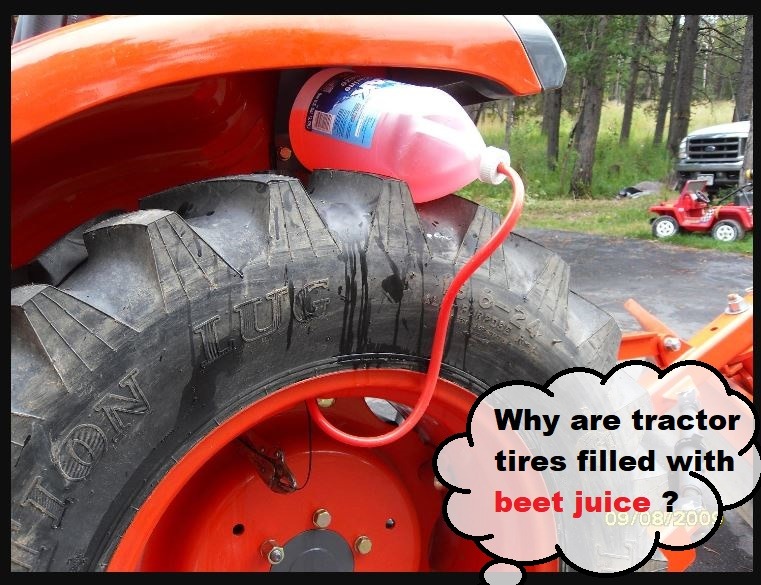Why are tractor tires filled with beet juice?
Why Are Tractor Tires Filled With Beet Juice?
Beet juice, a liquid ballast used in tractor tires, is relatively new. Ballasts are added to tractor tires to improve traction, stability and braking performance in wet or slippery conditions.
Beet juice makes a great ballast, as it’s non-toxic, not corrosive and doesn’t freeze. It has a greater specific gravity per gallon than water. The tractors can then put more weight on the rear tires to help improve traction.

How Does Beet Juice Improve Traction?
The traction force allows a tire’s tread to grip the surface. The weight of beet juice helps to press a tractor tire firmly into the ground when it is filled with the liquid. The increased area of contact creates more friction and improves traction.
How Does Beet Juice Improve Stability?
The ability to remain upright is a key characteristic of stability. The weight of heavy equipment can cause a tractor to shift forward and tip. The rear tires can be filled with beet juice to help shift the weight and improve stability.
What Are the Drawbacks of Using Beet Juice as Ballast?
The primary disadvantage of using beet juice as ballast is its cost. It is much more expensive than other options, such as water or even sand. The benefits of beet, like its non-toxicity and freeze-resistance, often outweigh their cost.
What Are the Benefits of Using Beet Juice as Ballast?
There are many benefits of using beet juice in tractor tires as ballast. There are several benefits to using beet juice as ballast in tractor tires.
- Non-toxic and non-corrosive: Beet juice does not harm the environment or damage tires and rims.
- Freeze-resistant: Beet juice is resistant to temperatures as low as -35° Fahrenheit. This makes it an excellent choice for applications in cold weather.
- High specific gravity: Beetjuice weighs more than water per gallon so that tractors can carry more weight on the rear tires.
- Biodegradable: Beet juice can be biodegraded and will not harm the environment when it leaks from the tires.
How Is Beet Juice Added to Tractor Tires?
A special pump is used to add beet juice to tractor tires. The tire must first be deflated before the pump can be inserted into the valve stem. The tire is inflated with beet juice until the desired pressure level has been reached.
How Much Beet Juice Should I Add to My Tractor Tires?
You must consider the size and weight of your tractor tires when calculating the amount of beet juice you should add. Generally, add beet juice until the tire is about 75% filled.
Can I Use Other Liquids as Ballast in My Tractor Tires?
There are many other liquids you can use as ballast for tractor tires. You can use:
- Water: Water is used as the main ballast in tractor tires. It’s cheap and easy to locate. Water is not as freezing-resistant as beet juice, so it is not the best choice for cold-weather applications.
- Sand: Sand can also be used as ballast in tractor tires. Sand is more expensive but also more effective in providing traction. Sand also freezes more slowly than water.
- Calcium chloride: The chemical compound is used for deicing vehicles. It also works well in icy or wet conditions. Calcium chloride corrodes metal and should not be used on tires with metal wheels.
- Antifreeze: This liquid is used to keep water from freezing. The liquid can be used to ballast tractor tires. Antifreeze, however, is more expensive and less effective than water or sand.
How Often Do I Need to Add Beet Juice to My Tractor Tires?
How often you add beet juice to your tractor’s tires depends on how heavy you are and how frequently you use it.
You may need to add the beet juice regularly if you use your tractor often and carry a lot.
You may only have to add beet juice once yearly if you don’t use your tractor as often or carry less weight.
Conclusion
Beet juice can be used as a ballast for tractor tires. It is an environmentally friendly, safe and effective option. It’s non-toxic, not corrosive, has a high-specific gravity, and is freeze-resistant.